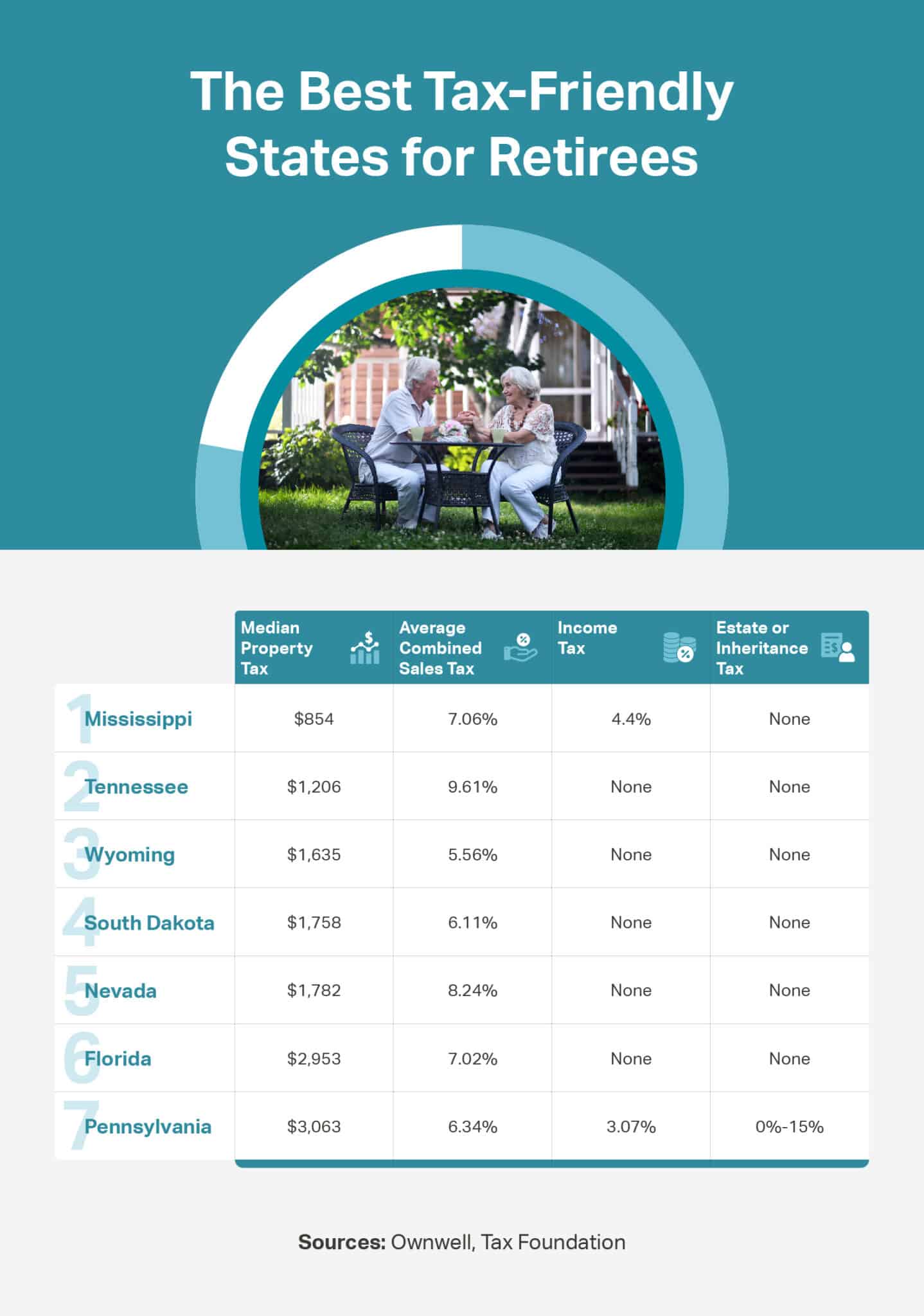Taxes can vary dramatically from state to state. Some don’t tax Social Security or retirement withdrawals, while others exclude all retirement income altogether. These differences can add up, potentially saving you thousands of dollars each year. You can make the most of your move to a 55+ active adult community by choosing one of the most tax-friendly states for retirees. If sunshine is calling your name, states like Florida are much better from a tax perspective than states like California or Arizona.

Of course, taxes are just one piece of the puzzle. Climate, proximity to family and friends, and access to quality health care all play important roles in your decision. But those topics are for another day. In this article, we’ll focus on the best tax-friendly states for retirees and how they can stretch your retirement dollars further.
1. Mississippi

Mississippi tops the list as the most tax-friendly state for retirees, offering an attractive combination of no taxes on retirement income and some of the lowest property taxes in the nation.
Property Taxes
Although Mississippi’s property tax rate is technically higher than the median, residents of the state enjoy a median property tax bill of only $854. This is significantly lower than the national median of $2,400. The savings come from a tax-assessed value that’s often much lower than full market value.
Sales Taxes
The state sales tax in Mississippi is 7%. When local rates of up to 1% are added in, the state has an average combined sales tax rate of 7.06%. This isn’t the lowest in the nation, but it is under the national average of 7.52%.
Retirement Income Taxes
Retirement income is exempt from the state’s income tax. Therefore, Social Security, pensions, and retirement accounts are all exempt from taxation.
Tax Exemptions for Seniors
If you’re 65 or older, you might qualify for a special property tax exemption covering the first $7,500 of your home’s value. Mississippi doesn’t impose an estate or inheritance tax.
2. Tennessee

The Volunteer State is one of several that offers retirees a tax haven with no state income tax. Although the sales taxes are higher than average, the overall tax picture makes Tennessee an attractive option for retirement living.
Property Taxes
The median property tax bill in Tennessee is significantly lower than the national average at just $1,206. With several affordable areas to live in, the state is one of the most retirement-friendly states for homeowners.
Sales Taxes
This is one area where Tennessee doesn’t compare well with the national average. While the average American pays 7.52% sales tax, residents of Tennessee pay a whopping 9.61%. However, this is offset by other tax savings.
Retirement Income Taxes
Tennessee doesn’t impose an income tax of any kind, meaning that your retirement income will be untouched regardless of what form it comes in.
Tax Exemptions for Seniors
In the Volunteer State, there are no estate or inheritance taxes. So, even if you have a sizable estate, your heirs won’t have to share it with the government.
Also, seniors in Tennessee may qualify for property tax relief, which reimburses part (or all) of the taxes paid on their primary home if they meet age, income, and residency requirements. Additionally, in some counties, an optional property tax freeze program is available. This allows eligible homeowners (typically those aged 65 and above) to lock in their tax amount at the level paid when they first qualify.
3. Wyoming

Wyoming offers an attractive tax landscape for retirees seeking financial advantages, with no state income tax and some of the lowest sales taxes in the country.
Property Taxes
With a median property tax bill of $1,635, Wyoming residents still pay significantly less than the national average of $2,400.
Sales Taxes
Wyoming has one of the lowest sales taxes in the country. The state itself imposes a sales tax rate of just 4%, though adding in local rates results in an average sales tax rate of 5.56%.
Retirement Income Taxes
Wyoming is another retirement destination that doesn’t have an income tax, making it a tax-friendly state for retirees.
Tax Exemptions for Seniors
Beginning January 1, 2025, homeowners aged 65 and older who have paid property taxes in Wyoming for at least 25 consecutive years may be eligible for a 50% exemption on the assessed value of their primary residence under a new “long-term homeowner” property tax exemption. Additionally, Wyoming offers a property tax deferral option (available in select counties) that allows qualifying homeowners (aged 62 or older or disabled) to defer payment of taxes rather than being fully exempt.
Also, there are no estate or inheritance taxes in the state, so your heirs won’t get a state tax bill as part of their inheritance. However, if you drive an electric vehicle, be aware that there’s an annual decal fee of $200.
4. South Dakota

South Dakota’s lack of income tax and below-average property taxes create an appealing financial environment for those who want to stretch their retirement dollars.
Property Taxes
At $1,758, the median property tax bill in South Dakota remains significantly below the national median, although the variation between different areas of the state can be substantial. Seniors considering retirement in the state should research the relevant local taxes carefully to avoid the more expensive areas.
Sales Taxes
With a state sales tax of 4.2% and an average combined state and local sales tax rate of 6.11%, South Dakota comes in significantly below the national average of 7.52%.
Retirement Income Taxes
Like many other states on our list, South Dakota does not impose an income tax on residents, allowing for more money from your retirement funds.
Tax Exemptions for Seniors
South Dakota may also be a good choice for retirees who want to avoid leaving their family members with a tax bill, as it has no estate or inheritance taxes.
In South Dakota, homeowners aged 65 or older can apply for a property assessment freeze, which locks in the assessed value under certain income and value limits. Additionally, for individuals aged 70 or older (or their surviving spouses), a homestead exemption program allows for deferring payment of property taxes until the property is sold.
5. Nevada

The Silver State’s absence of income tax makes it another excellent option for retirees with substantial withdrawals from their retirement accounts.
Property Taxes
Though getting closer to the national average than earlier entries, the median property tax bill in Nevada is still lower than in many other states, at $1,782.
Sales Taxes
The average combined state and local sales tax rate is 8.24% in Nevada. This comes out to quite a bit more than the national average, though the costs are offset by lower taxes in other areas.
Retirement Income Taxes
Nevada is another state with no income tax, so none of your retirement income will be taxed at the state level.
Tax Exemptions for Seniors
Nevada does not generally offer a blanket property tax exemption for seniors based solely on age. However, it’s a very tax-friendly place for the loved ones you’ll leave behind one day, as it has no estate or inheritance tax.
6. Florida

The Sunshine State’s lack of income tax and reasonable property taxes is a big reason it’s such a popular retirement destination.
Property Taxes
Florida has a diverse range of tax areas. While some areas are expensive, and some are cheap, the state median for property taxes is $2,953.
Sales Taxes
Florida has a 6% statewide sales tax. Localities vary widely, adding between 1% and 2%, with an average combined rate of 7.02%.
Retirement Income Taxes
Along with the sales tax slightly under the national average, Florida residents make up for the slightly expensive property taxes through the absence of an income tax.
Tax Exemptions for Seniors
Residents of Florida who own property that they use as their permanent residence may be eligible for a property tax break of up to $50,000, thanks to the state’s homestead exemption.
7. Pennsylvania

While it does have an income tax, Pennsylvania’s exemption of retirement income and relatively moderate tax rates make it a good choice for those looking to retire on the East Coast.
Property Taxes
The median property tax bill in Pennsylvania is $3,063. This places it significantly higher than other states on the list, although there is still room to save on other taxes compared to more expensive states.
Sales Taxes
The state sales tax is 6%, with local taxes adding to the total, resulting in an average rate of 6.34%. This puts it 17th in the nation for the lowest sales tax, providing some offset to the slightly higher-than-average property taxes.
Retirement Income Taxes
Many residents of Pennsylvania will be required to pay income tax, although they’ll pay a relatively low rate of 3.07%. The big advantage for retirees is that Social Security and qualifying forms of retirement income are exempt from this tax.
Tax Exemptions for Seniors
In Pennsylvania, tax relief is primarily provided through the Property Tax/Rent Rebate (PTRR) program, which offers eligible older adults or individuals with disabilities up to $1,000 as a rebate on property taxes or rent.
55places.com Can Help You Find the Right Home for Your Budget
No matter which tax-friendly state catches your eye, finding the right 55+ community can make all the difference in your retirement lifestyle. At 55places.com, our expert team is ready to help you explore low-maintenance homes in the states that make your retirement dollars go further.
Whether you’re drawn to the sunny shores of Florida, the wide-open spaces of Wyoming, or the relaxed pace of Tennessee, we’ll connect you with the perfect community that fits your budget, lifestyle, and goals. Start your search today at 55places.com and discover where your best years can truly begin.
FAQ: Tax-Friendly Retirement States
1. What does “tax-friendly” mean for retirees?
A tax-friendly state for retirees typically imposes low or no taxes on retirement income, including Social Security, pensions, and withdrawals from 401(k) and IRA accounts. These states often also feature low property and sales taxes.
2. Which states do not tax Social Security income?
Most states do not tax Social Security benefits. The few that do include Colorado, Connecticut, Minnesota, Montana, New Mexico, Rhode Island, Utah, Vermont, and West Virginia (with various exemptions or income limits).
3. Which states have no income tax at all?
As of 2025, Florida, Tennessee, Texas, Nevada, New Hampshire, South Dakota, Wyoming, Washington, and Alaska do not have a state income tax, making them highly attractive to retirees.
4. Are there any states that tax pensions?
Yes, some states, including California, Vermont, and Nebraska, tax pension income at the same rates as regular income. Others, like Pennsylvania and Illinois, exempt pensions from state income taxes.
5. Do any states tax 401(k) or IRA withdrawals?
Most states tax withdrawals from retirement accounts. Alaska, Florida, Illinois, Iowa, Mississippi, Nevada, New Hampshire, Pennsylvania, South Dakota, Tennessee, Texas, Washington, and Wyoming do not.
6. How do sales taxes affect retirees on a fixed income?
High sales taxes can increase the cost of living, especially for retirees on fixed incomes. States like Wyoming and South Dakota keep sales taxes low, helping retirees stretch their dollars further.
7. Are there states that offer senior-specific tax breaks?
Yes, many states offer senior-focused property tax exemptions or credits. Examples include Mississippi’s property tax exemption on the first $7,500 of home value and Tennessee’s property tax relief and freeze programs for seniors.
8. Is Florida still one of the best tax-friendly states for retirees?
Yes, Florida remains one of the most popular and tax-friendly states for retirees because of no state income tax, homestead property exemptions, and overall affordability.
9. Do tax-friendly states also have a lower cost of living?
Often, yes, but not always. While some states (such as Mississippi and Tennessee) are both tax-friendly and affordable, others (like Nevada) have higher housing or insurance costs despite favorable tax rates.
10. Should taxes be the only factor when choosing where to retire?
No. While taxes can have a significant financial impact, retirees should also consider factors such as climate, health care access, recreation, and proximity to family when selecting a retirement destination.









